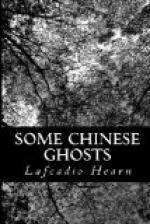Also the Long-kang-yao, green as the seedling of a pea, but bearing also paintings of sun-silvered cloud, and of the Dragons of Heaven;
Also the Tching-hoa-yao,—pictured with the amber bloom of grapes and the verdure of vine-leaves and the blossoming of poppies, or decorated in relief with figures of fighting crickets;
Also the Khang-hi-nien-ts’ang-yao, celestial azure sown with star-dust of gold; and the Khien-long-nien-thang-yao, splendid in sable and silver as a fervid night that is flashed with lightnings.
Not indeed the Long-Ouang-yao,—painted with the lascivious Pi-hi, with the obscene Nan-niu-sse-sie, with the shameful Tchun-hoa, or “Pictures of Spring”; abominations created by command of the wicked Emperor Moutsong, though the Spirit of the Furnace hid his face and fled away;
But all other vases of startling form and substance, magically articulated, and ornamented with figures in relief, in cameo, in transparency,—the vases with orifices belled like the cups of flowers, or cleft like the bills of birds, or fanged like the jaws of serpents, or pink-lipped as the mouth of a girl; the vases flesh-colored and purple-veined and dimpled, with ears and with earrings; the vases in likeness of mushrooms, of lotos-flowers, of lizards, of horse-footed dragons woman-faced; the vases strangely translucid, that simulate the white glimmering of grains of prepared rice, that counterfeit the vapory lace-work of frost, that imitate the efflorescences of coral;—
Also the statues in porcelain of divinities: the Genius of the Hearth; the Long-pinn who are the Twelve Deities of Ink; the blessed Lao-tseu, born with silver hair; Kong-fu-tse, grasping the scroll of written wisdom; Kouan-in, sweetest Goddess of Mercy, standing snowy-footed upon the heart of her golden lily; Chi-nong, the god who taught men how to cook; Fo, with long eyes closed in meditation, and lips smiling the mysterious smile of Supreme Beatitude; Cheou-lao, god of Longevity, bestriding his aerial steed, the white-winged stork; Pou-t’ai, Lord of Contentment and of Wealth, obese and dreamy; and that fairest Goddess of Talent, from whose beneficent hands eternally streams the iridescent rain of pearls.
* * * * *
And though many a secret of that matchless art that Pu bequeathed unto men may indeed have been forgotten and lost forever, the story of the Porcelain-God is remembered; and I doubt not that any of the aged Jeou-yen-liao-kong, any one of the old blind men of the great potteries, who sit all day grinding colors in the sun, could tell you Pu was once a humble Chinese workman, who grew to be a great artist by dint of tireless study and patience and by the inspiration of Heaven. So famed he became that some deemed him an alchemist, who possessed the secret called White-and-Yellow, by which stones might be turned into gold; and others




